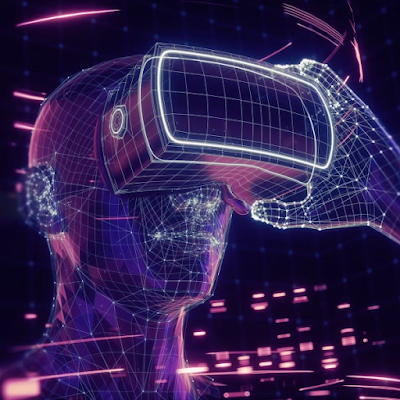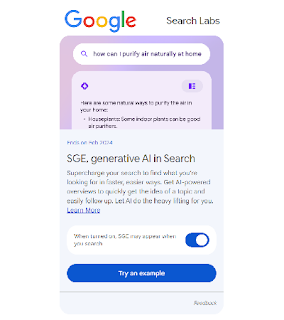AI and the Metaverse: The Future of Human-Machine Interaction
The metaverse is a virtual world where people can interact with each other and with digital content. AI is playing a key role in the development of the metaverse, and it is poised to change the way we live, work, and play. In this blog post, we explore the intersection of AI and the metaverse, and we look at some of the potential future applications of AI in the metaverse.
Introduction
The
metaverse is an extraordinary virtual world where people can engage in
interactions with one another and immerse themselves in captivating digital content.
It's still in its early stages of development, but it has the potential to
change the way we live, work, and play.
Artificial intelligence (AI) is playing a key role in the development of the metaverse. AI is being
used to create realistic avatars, generate content, and power virtual
assistants. As AI technology continues to advance, it will become even more
integrated into the metaverse, making it a more immersive and engaging
experience.
In this
blog post, we will explore the intersection of AI and the metaverse. We will
discuss how AI is being used in the metaverse today, and we will look at some
of the potential future applications of AI in the metaverse.
What is the metaverse?
The metaverse
is a virtual world that is created by the convergence of virtual reality (VR),
augmented reality (AR), and the internet. It's a place where people can
interact with each other and with digital content in a way that feels real.
The
metaverse is still in its early stages of development, but it has the potential
to change the way we live, work, and play. For example, we could use the
metaverse to attend virtual conferences, shop for clothes, or even go to
concerts.
How AI is being applied in the metaverse today
There are
already a number of ways that AI is being used in the metaverse today. Here are
a few examples:
Creating realistic avatars: AI is being used to create realistic avatars that look and move like
real people. This is essential for creating a sense of immersion in the
metaverse. For example, the company Nvidia is using AI to create
hyper-realistic avatars for its Omniverse platform.
Generating content: Within the metaverse, AI takes on the remarkable task of creating
content, including 3D models, textures, and animations. This makes it possible
to create vast and complex virtual worlds that would be impossible to create by
hand. For example, the company Epic Games is using AI to generate content for
its Unreal Engine 5 platform.
Powering virtual assistants: AI is being used to power virtual assistants that can help users
navigate the metaverse and interact with digital content. This makes it easier
for users to find what they're looking for and get the most out of the
metaverse experience. For example, the company Google is using AI to power its
Project Starline virtual assistant.
Potential future applications of AI in the metaverse
As AI
technology continues to advance, it will become even more integrated into the
metaverse. AI will be used to create even more realistic avatars, generate even
more content, and power even more sophisticated virtual assistants. This will
make the metaverse a more immersive and engaging experience, and it will open
up new possibilities for human-machine interaction.
Here are a few potential future applications of AI in the metaverse:
Personalized experiences: AI can be used to create personalized experiences in the metaverse. For
example, AI could be used to recommend content to users based on their
interests, or to provide users with customized training in a virtual
environment.
Virtual collaboration: AI can be used to enable virtual collaboration in the metaverse. For
example, AI could be used to translate conversations between different
languages, or to provide real-time feedback on presentations.
Virtual learning: AI can be used to enable virtual learning in the metaverse. For
example, AI could be used to create personalized learning experiences for
students, or to provide students with feedback on their work.
Virtual entertainment: AI can be used to create virtual entertainment experiences in the
metaverse. For example, AI could be used to create realistic simulations of
sporting events, or to generate new forms of interactive entertainment.
What are the challenges of using AI in the metaverse?
There are a
number of challenges to using AI in the metaverse, including:
- Privacy: AI can collect a lot of data about users, which raises privacy
concerns.
- Bias: AI can be biased, which can lead to discrimination against certain
groups of people.
- Security: AI can be hacked, which could lead to security breaches in the metaverse.
The future of AI and the metaverse
The future
of AI and the metaverse is still uncertain, but it is clear that these two
technologies are on a collision course. As they continue to develop, they will
become increasingly intertwined, and they will have a profound impact on the
way we live, work, and play.
I am
excited to see what the future holds for AI and the metaverse. I think it has
the potential to be a truly transformative technology, and I can't wait to see
what we can accomplish together.
In the
meantime, I'll be here, writing about the latest developments and sharing my
thoughts on how AI and the metaverse are changing the world. So, fasten your
seat belts, and let's explore the future together!
Conclusion
The
metaverse is a rapidly evolving technology, and AI is playing a key role in its
development. As AI technology continues to advance, it will become even more
integrated into the metaverse, making it a more immersive and engaging
experience.
I am
excited to see what the future holds for AI and the metaverse. I think it has
the potential to be a truly transformative technology, and I can't wait to see
what we can accomplish together.




Comments
Post a Comment